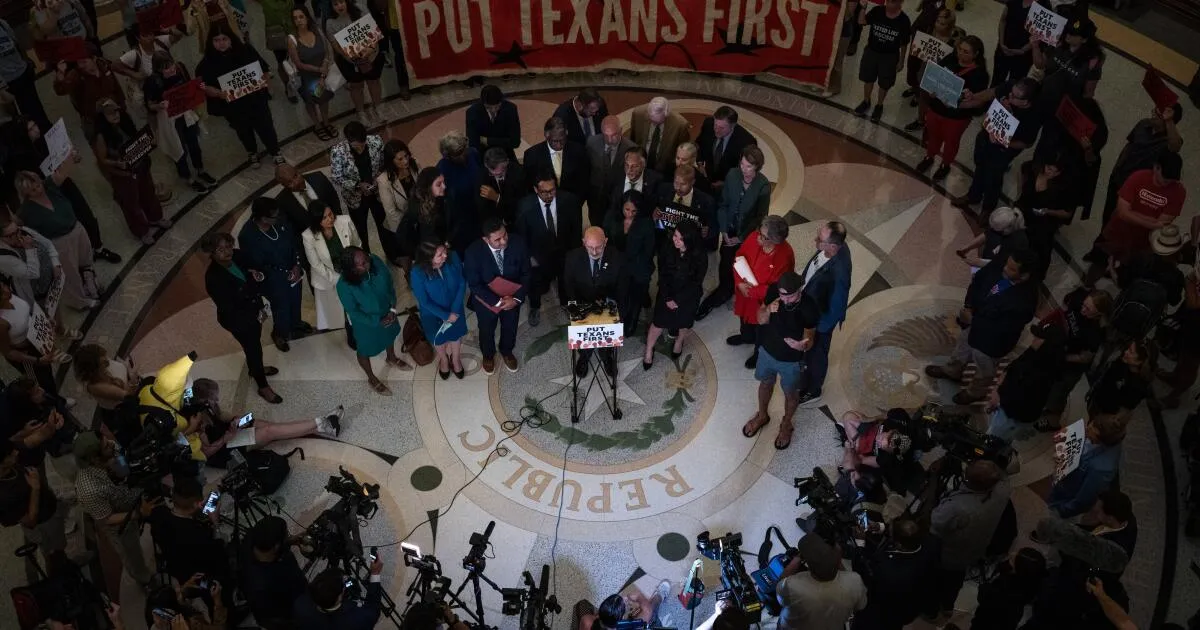
In a recent evening social media post, former President Donald Trump expressed his enthusiasm over a significant partisan victory that could have lasting effects on American political dynamics. “Big WIN for the Great State of Texas!!! Everything Passed, on our way to FIVE more Congressional seats and saving your Rights, your Freedoms, and your Country, itself,” Trump proclaimed. His comments referred to Texas's mid-decade redistricting plan, a strategy aimed at securing more Republican seats in Congress and reinforcing Trump’s influence leading up to the 2026 midterm elections.
Trump's excitement did not go unnoticed. He pointed to other states like Florida and Indiana, suggesting that they might follow Texas's lead in similar redistricting efforts. The day after Trump's announcement, California Governor Gavin Newsom countered with a show of strength, unveiling a new congressional map designed to benefit Democrats, which he plans to present to voters. “We got here because the president of the United States is one of the most unpopular presidents in U.S. history,” Newsom said, framing California's initiative as a necessary defense against Trump’s maneuvers.
In the past week, high-profile political leaders have abandoned any pretense of fairness, engaging in a fierce partisan struggle for power that has alarmed many observers of American democracy. Texas state Rep. Gene Wu voiced concerns over the implications of these actions, stating, “America is headed towards true authoritarian rule if people do not stand up.” The race to redraw congressional lines began with Trump’s declining approval ratings, pressuring Texas to adjust its district maps to favor Republicans and avoid a confrontational House majority.
As states like Texas and California enter this redistricting fray, they represent nearly 70 million Americans, but this battle is expanding nationwide. Trump’s comments imply that other states are considering similar redistricting plans, which could intensify the divide between blue and red political strongholds, potentially silencing millions of voters from minority parties in Congress.
Though the practice of gerrymandering is not new, the current climate reflects a shocking shift in how both parties are willing to leverage this tactic unapologetically. Experts argue that this aggressive and bipartisan approach to redistricting is a direct result of Trump’s influence on American politics. His campaign promises of a “Golden Age” for America have been accompanied by a clear intention to manipulate the political landscape to benefit his party, whether through redistricting or limiting voter participation.
During a recent rally, Trump remarked, “In four years, you don’t have to vote again. We’ll have it fixed so good, you’re not gonna have to vote.” Such statements raise alarms about the state of democracy and the potential for disenfranchisement as partisan interests take precedence over fair representation.
The redistricting conflict has dominated political discussions due to its potential to reshape Congress and further empower Trump in a second term. Sam Wang, president of the Electoral Innovation Lab at Princeton University, noted that inquiries about gerrymandering have surged in recent weeks, indicating growing concern among the public and the media about the implications for voting rights and representation. Wang expressed worry that these developments could lead to the erosion of protections established under the Voting Rights Act of 1965.
Wu highlighted the dangers of allowing politicians to unilaterally redraw maps for their advantage, particularly how it disenfranchises minority voters. He warned that such practices could lead to a lack of democracy, stating, “There would be no democracy left.” He emphasized the difference between Texas's aggressive redistricting and California's defensive measures aimed at counteracting that power grab.
Texas Governor Greg Abbott defended his state’s new congressional map, dismissing California’s efforts as a “joke” and suggesting that other Republican-led states would follow suit to expand their political influence. Legal experts have raised concerns over the constitutionality of these moves, particularly in how they may violate the Voting Rights Act. Sara Rohani from the Legal Defense Fund emphasized that fair representation is a fundamental right for all Americans, noting the continuous struggle for equitable voting power.
As political leaders grapple with the ongoing redistricting battle, the future of American democracy hangs in the balance. Newsom has called on Democrats to adopt a more aggressive stance against Trump’s tactics, recognizing the high stakes involved. He expressed pride in California's legislative response and confidence that voters will back the new congressional map despite initial polling suggesting uncertainty.
The current political landscape, shaped by Trump's influence and the aggressive partisan tactics employed by both parties, raises critical questions about the future of democratic governance in the United States. As the redistricting war continues, all eyes will be on how these political maneuvers will impact representation and the fundamental rights of voters across the nation.